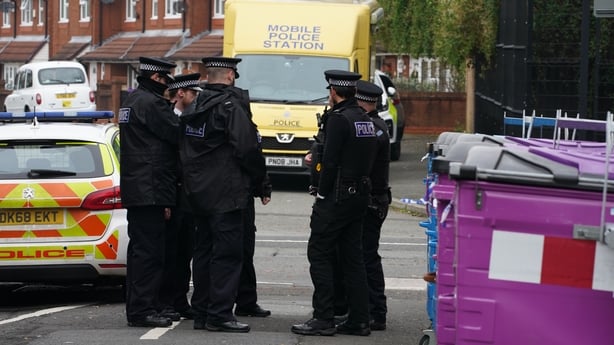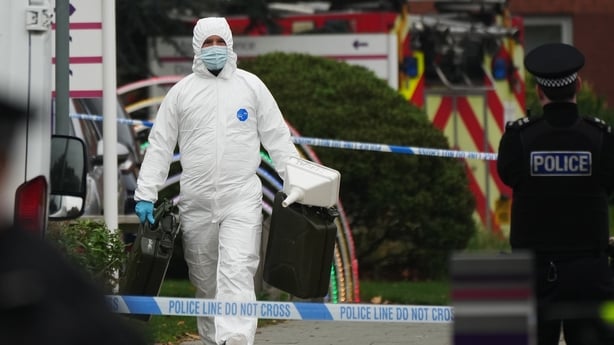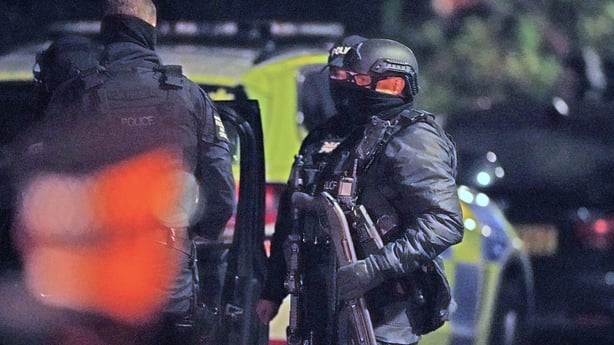Britain's terrorism threat level has been raised from "substantial" to "severe", the second-highest level, meaning an attack is highly likely, following yesterday's deadly blast in Liverpool.
"The Joint Terror Analysis Center are now increasing the United Kingdom's threat level from substantial to severe," Home Secretary Priti Patel told reporters, referring to the security services' unit responsible for setting the level.
British Prime Minister Boris Johnson told a Downing Street press conference the attack outside Liverpool Women's Hospital was "sickening".
The Prime Minister said: "What yesterday showed above all is that the British people will never be cowed by terrorism, we will never give in to those who seek to divide us with senseless acts of violence.
"And our freedoms and our way of life will always prevail."
He said emergency services responded with "such speed and professionalism".
But he added: "It is a stark reminder of the need for us all to remain utterly vigilant."
The suspected terrorist has been named as 32-year-old Emad Al Swealmeen.
Counter Terrorism Police North West said they believed Al Swealmeen died after a car exploded shortly before 11am on Sunday outside the hospital.
Ms Patel said the terror threat level had been raised because there had been two attacks in the space of a month.
Speaking to broadcasters, Ms Patel said: "The Joint Terrorism Analysis Centre, Jtac, are now increasing the United Kingdom's threat level from substantial to severe.
"And there's a reason for that, and that reason is because what we saw yesterday is the second incident in a month."
Ms Patel said the attack had had a "very significant impact across the community" in Liverpool and her thoughts were with people in the city.

Ms Patel said the "context" of there being two terrorist incidents in the space of a month was "really important".
The Home Secretary said she could not expand "for obvious reasons", but added: "I should just conclude my remarks by saying that our security and intelligence services prevent all sorts of acts, day in, day out.
"And of course, they understand the landscape, they see context, they see all sorts of things that keep our country safe and secure every single day and that work will continue."
Assistant Chief Constable Russ Jackson from Counter-Terrorism North West said the man who died in the blast brought a homemade bomb with him into a taxi and asked to be taken to Liverpool Women's Hospital.
The man was picked up in the Rutland Avenue area of the city and taken to the hospital. As the car reached the passenger drop off point, it exploded.
Mr Jackson said the motivation for the blast was unclear but the device was "built by the passenger" who died.
The mayor of Liverpool has praised the "heroic" taxi driver for his efforts to limit the impact when his car exploded in the city on Remembrance Sunday.
Meanwhile, a fourth man has been arrested in connection with the incident.
Mr Jackson said: "Our inquiries have led us to two addresses. The first was Sutcliffe Street in the Kensington area of Liverpool and at this location three men aged 21, 26 and 29 were arrested yesterday under 41 [Section] of the Terrorism Act.
"A short while ago, again in the Kensington area, a further man aged 20 was arrested under S41 of the Terrorism Act.
"They will be interviewed by Counter Terrorism officers later today.
Residents were evacuated as armed police were seen in Rutland Avenue, in the Sefton Park area, until the early hours of the morning.
The driver of the cab, named locally as David Perry, was treated in hospital after fleeing the car just before it burst into flames, and has now been discharged.
Speaking on BBC Radio 4's Today programme, mayor Joanne Anderson said: "The taxi driver, in his heroic efforts, has managed to divert what could have been an absolutely awful disaster at the hospital.
"Our thanks go to him and our emergency services, and authorities have worked through the night to divert anything further and we've all been on standby and in constant contact to provide any support that's needed."
She added: "Well, we knew that the taxi driver had stood out and locked the doors, we knew that early on."
However, she added it was important not to get drawn into speculation about the incident.

Counter-terrorism police have said they are keeping an open mind about the cause of the explosion and are working closely with Merseyside Police and, according to reports, MI5.
Sections of Sutcliffe Street and Boaler Street have been cordoned off, with a heavy police presence at the scene as inquiries continue.
A similar police cordon was in place at Rutland Avenue, where Greater Manchester Police said a small number of addresses were evacuated as a precaution.

Earlier, images of a vehicle on fire, and later burnt out, outside the hospital were shared online.
A spokesman for Merseyside Police said: "So far we understand that the car involved was a taxi which pulled up at the hospital shortly before the explosion occurred."
Phil Garrigan, chief fire officer of Merseyside Fire and Rescue Service, said the car fire was "fully developed" when two crews arrived shortly after 11am.
He told reporters at the scene the fire was extinguished "rapidly" but there was one fatality, adding: "Another individual had left the vehicle prior to the fire developing to the extent that it did."
Additional reporting PA

